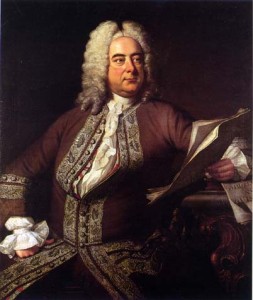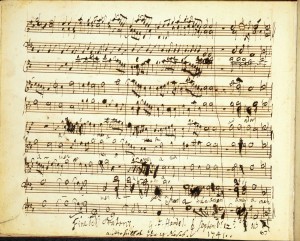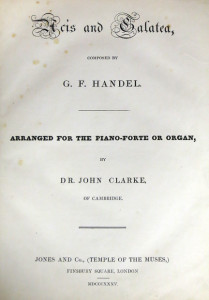
Handel, later in life.
The year 1685 was monumental in the world of classical music. Domenico Scarlatti, Johann Sebastian Bach, and George Frederich Handel were all born within a few months of each other, and all came to be titans of the Baroque era. Unlike such composers as Bach, Mozart and Beethoven, whose stories are considerably well-known in the musical world, to those outside the classical arena, Handel’s life is somewhat of a lesser-known story. Though many people walking on the street (at least the streets that I walk around) could tell you that by the end of his life Beethoven was deaf, or that Mozart was a child prodigy, one with an annoying laugh at that (oh wait, that’s just the movie Amadeus)… what can you tell me about Handel? Not much right? So let’s start with this… he was born in Halle, Germany, he once challenged another musician to a duel over said musician’s opera, and he wrote some of the most beloved pieces of classical music now enjoyed in this day.
Compared to Mozart’s father, who forced him to perform, blindfolded, for royalty, Handel’s family was not quite of the same level of musical motivation. Handel’s father wished him to study Civil Law, and was highly distressed by George’s propensity toward music, even going so far as to forbid him to have anything to do with musical instruments, of any kind. Handel could not abide by these strict rules, and said to have snuck a clavichord into an upstairs room in his family’s home in order to teach himself the keyboard instrument. As a young boy, Handel and his strict father traveled to Weissenfels to visit a relative who was serving as valet to Duke Johann Adolf I. Much to everyone’s surprise (given the secretive lessons in the attic), when lifted onto an organ stool he astonished the small crowd with his musical talent (and such with little to no formal musical training whatsoever). The duke himself helped convince Handel’s father that music lessons for the young boy were imperative. As a result, Handel began training with the oboe, violin, harpsichord and organ with the organist of their local church. By 1698, at the age of 13, Handel had played for royalty – Frederick I of Prussia.
Handel enjoyed early successes after his first posting as an organist in 1702, and as he took positions throughout Germany and Italy, and then in England, where he spent the most of his life, he composed a grand total of “42 operas, 29 oratorios, more than 120 cantatas, trios and duets, numerous arias, chamber music, a considerable amount of ecumenical pieces, odes and serenatas, and 16 organ concerti” (Wikipedia). His opera Rinaldo, performed in 1711, impressed English audiences so much that Handel was able to make a permanent move to London and a few short years later composed his famous Water Music for a royal boat outing of King George I. He enjoyed mass popularity throughout the 1720s and 30s, composing many of his operas and oratorios in that time. By the time he composed his oratorio “Messiah” (his 6th composition in English – most of his work to that time had been in Italian language and style) in 1741, he had a statue honoring him in the royally maintained Vauxhall Gardens (to say the least, an unusual privilege for a living person). His Messiah initially experienced an modest public reception, but steadily rose in popularity and it is now “one of the best- known and most frequently performed choral works in Western music” (Wikipedia).
Unlike many other composers throughout history, Handel, to this very day, has been continuously revered by his colleagues and contemporaries. “Bach attempted, unsuccessfully, to meet Handel while he was visiting Halle. Mozart is reputed to have said of him, ‘Handel understands affect better than any of us. When he chooses, he strikes like a thunder bolt.’ To Beethoven he was ‘the master of us all… the greatest composer that ever lived. I would uncover my head and kneel before his tomb… Go to him to learn how to achieve great effects, by such simple means.’” (Wiki). For living in such a musically-charged era, Handel achieved successes that many others never were able to experience.



